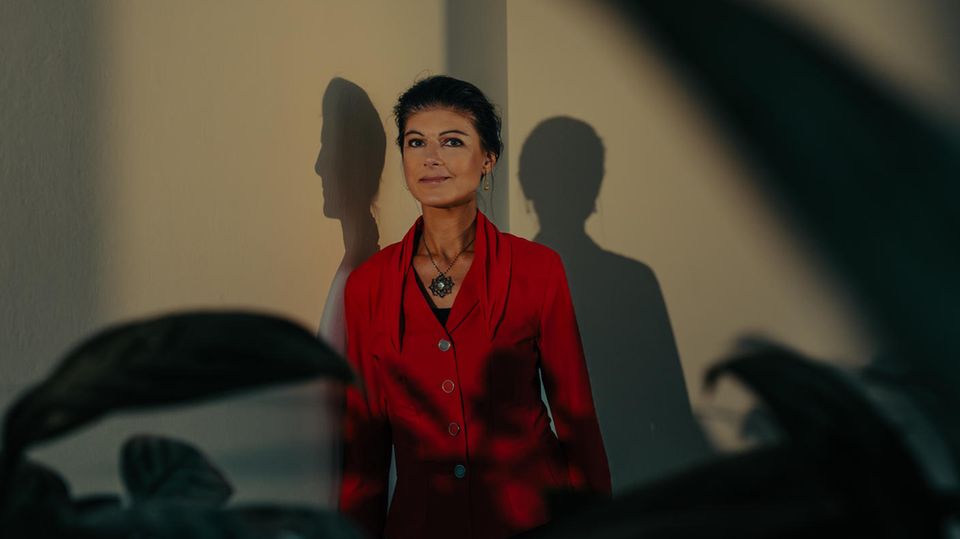While researching a portrait, I met the then Left Party politician in her office. It will be a conversation that I still think about to this day.
Making-of – that’s the name of our new format star.de. We want to give you a personal look behind the scenes, tell us about our everyday journalistic life, what we experience during research and what motivates us in the editorial team. We’re starting a little series looking back at our moments in 2023.
My personal moment of the year? Maybe this one. It’s a Friday afternoon in March 2023, I’m sitting with Sahra Wagenknecht in her Bundestag office, Jakob-Kaiser-Haus, room number 1,735. It should be a professional conversation, for one star-Portrait I want to write. About this woman who has been stirring up the republic for months: with her criticism of the arms deliveries to Ukraine, her demands for more toughness in migration policy, her nebulous hints about founding her own new party.
But it will be a very personal encounter. Wagenknecht talks about her childhood. Her father, who left the family when she was three years old. How it felt as a little girl to sit on his strong shoulders. How he once carried her up a steep flight of stairs. How much she liked him.
“And suddenly one of them is gone”
Then she says: “And suddenly one of them is gone.”
Silence in the office.
It is very rare for politicians to reveal anything about themselves. And if so, it usually doesn’t happen without consideration. “I come from a poor background and often there wasn’t enough money at the end of the month” – that’s a very popular story, for example. It doesn’t have to be wrong. And yet a certain manipulative intention shines through, the message that is supposed to be conveyed: Look, I know about the worries and needs of the “ordinary people”, I was one of them myself.
But: be abandoned? To round off a story about your own life? Actually rather unsuitable.
Sahra Wagenknecht was beaten – and she hit back
Sahra Wagenknecht has said little about her childhood in the GDR. There is a biography by the social psychologist Christian Schneider that is worth reading, in which she reveals a lot about herself. To be honest, I was more than interested in going through her – in my opinion, somewhat crude – theses about the Ukraine war, the alleged mistakes of the Corona policy or the future of Europe with her for the umpteenth time. I let her tell the story.
And she talked about how she continued to write letters to her father, an exiled Iranian who had returned to his home country to help overthrow the Shah’s dictatorship, for years – without ever sending them. How she acquired a strange handwriting, German but vibrantly stylized in Persian. Her father should never appear again. She must have missed him very much, for many years afterwards. In her childhood she was often alone. She was teased because of her face, which seemed somewhat foreign in what was then the GDR. Once a child asked, “Are you Chinese?” She was beaten – and she hit back.
Those were the topics on this Friday afternoon in room 1,735 in the Jakob-Kaiser-Haus.
Of all people, this woman, who always keeps others at a distance with non-binding friendliness, buttoned up like a costume, coolly reasoning and lecturing, – of all people, she spoke about the first great pain in her life and about her early loneliness.
Maybe she wanted to show: I’m not as aloof as everyone thinks, I’m human too. And therefore tangible, selectable. Maybe she just wanted to talk about something that still moves and shapes her today. An early injury. An initial, shock-like feeling of insecurity, possibly: rejection. How can you leave a three year old girl behind like that? Can anything really be more important? Was there no longing at all for the one who was suddenly “gone”?
For Wagenknecht, politics is 90 percent psychology
I have often heard: Journalists should be careful with (lay) psychological interpretations. That’s correct. On the other hand, I have spent many years working for the star Having accompanied and observed politicians, I have learned one thing: politics is essentially psychology, and that is the only way it can be understood and explained. In addition, of course, there is the so-called “content”. But I would value psychology’s explanation much higher. In the Wagenknecht case, to be honest: 90 percent.
She has now long since left her old party, the Left, and founded a new one. The “Alliance Sahra Wagenknecht” has set out to plow up the German party landscape with a wild mix of conservative-national and old-social democratic political pieces. The first big test will be the European elections next year.
In the theaters of the Republic, Wagenknecht regularly reads from her bestseller “The Self-Righteous,” an angry reckoning with the German “lifestyle left” and its alleged green-woken opinion dictatorship. Sometimes people stand up and applaud for minutes. She then bathes in the approval of all those who feel that this country is no longer their country, that they no longer have a home. Sahra Wagenknecht never had one either.
Is that why we get along so well?


